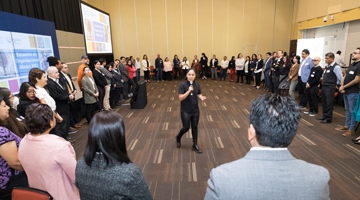Alberto Baillères Foundation
March 2023
Recognition of work with civil society at the 2023 Meeting of Partner Organizations
- The meeting took place on March 2 and 3, at the headquarters of GNP in Mexico City.
- Around 100 people participated: representatives of civil society organizations, education authorities, and experts from various institutions.

In order to recognize civil society partner organizations’ contribution to the execution of the Social Model, as well as identify lessons learned and areas of opportunity in joint work, the Alberto Baillères Foundation organized the first Meeting of Partner Organizations at the headquarters of GNP, in Mexico City.
Thursday, March 2, the first day of the meeting, included a program with presentations delivered by experts who shared best practices and posed common challenges faced by civil society organizations. The keynote lecture was delivered by Rosa Wolpert, United Nations Educational, Scientific and Cultural Organization (UNESCO) Education Officer in Mexico, who discussed the major challenges facing education and stressed the role of partnerships in confronting these challenges and achieving sustainable results.
The rest of the presentations addressed issues such as professionalization in civil society, with the participation of Lila Gasca, Pro Bono Director of Hogan Lovells Mexico; models of community interaction, presented by three representatives from the Instituto DIA; and project evaluation, discussed by María del Carmen Romero, Deputy Director of Social Model Development and Evaluation at the Alberto Baillères Foundation.
These presentations were interspersed with a dynamic of three moments of dialogue in working groups, where the meeting’s nearly 100 participants were able to exchange lessons they learned through the Social Model, as well as their concerns and ideas for improving joint work and creating synergies between partner organizations.
The program for the second day of the meeting (Friday, March 3) included two panels. The first of these, “Challenges and Opportunities for Civil Society in the Mexican Education Sector on the Road to 2030,” included the participation of three representatives of civil society organizations (Fundación EDUCA, YouthBuild, and Enseña por México), as well as moderation by Leticia Landeros, Education Consultant for UNESCO Mexico. The panel discussed the common challenges these organizations face and emphasized the need to understand education as an enabling right for social transformation.
Rosy Gluyas, Director General of the Alberto Baillères Foundation, served as moderator for the second panel, “Challenges and Opportunities for Interaction between Civil Society and Education Communities in Mexico.” The panelists were education authorities from Ecatepec, Iztapalapa, and Yucatan —the three localities where the Social Model is currently being implemented. The panelists discussed the processes of collaborative work that they have experienced with the Foundation and which have implied changes in forms of acting in the community and educational spaces.
One of the general conclusions of the meeting was the importance of continuing to promote spaces of dialogue and exchange of experiences. The need to provide cross-curricular training within civil society organizations was also emphasized. To this end, the Foundation will assume its leadership role and plan professionalization events; additionally, the Meeting of Partner Organizations will be held annually.
Source